

Pentagon proposes more robust role for its cyber-specialists. “Without a doubt it would be a very big and significant step forward,” said a senior defense official, speaking on the condition of anonymity to discuss a sensitive topic.
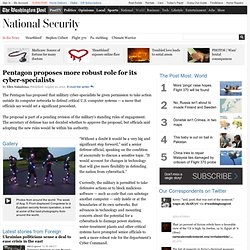
“It would account for changes in technology that will give more flexibility in defending the nation from cyberattack.” Currently, the military is permitted to take defensive actions or to block malicious software — such as code that can sabotage another computer — only inside or at the boundaries of its own networks. But advances in technology and mounting concern about the potential for a cyberattack to damage power stations, water-treatment plants and other critical systems have prompted senior officials to seek a more robust role for the department’s Cyber Command.
The proposed rules would open the door for U.S. defense officials to act outside the confines of military-related computer networks to try to combat cyberattacks on private computers, including those in foreign countries. Researchers Release Detection Tool For Gauss Malware's Palida Narrow Font. Mark Collins - Cyber Security Update. Lots going on: 1) Canada (but not our government): Towards stewardship in cyberspace … Ron Deibert (PhD, University of British Columbia) is Professor of Political Science, and Director of the Canada Centre for Global Security Studies and the Citizen Lab at the Munk School of Global Affairs, University of Toronto.

Issues Briefing: Reporting on Cyber-Security. American companies large and small are being targeted by cyber-criminals looking to empty bank accounts, steal manufacturing plans or hijack valuable intellectual property.
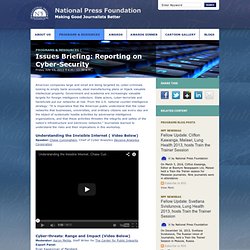
Government and academia are increasingly valuable targets for foreign intelligence collectors. State actors, cyber-terrorists and hacktivists put our networks at risk. From the U.S. national counter-intelligence strategy: “It is imperative that the American public understand that the cyber networks that businesses, universities, and ordinary citizens use every day are the object of systematic hostile activities by adversarial intelligence organizations, and that these activities threaten the integrity and safety of the nation’s infrastructure and electronic networks.”
Facebook 'like' leads to a lawsuit, sparks free speech debate. It started in 2009 when Daniel Ray Carter, a deputy sheriff in Hampton, Va., pushed the little thumbs up button on his Facebook page.
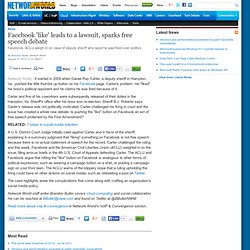
Addressing Cyber Instability Executive Summary. After two years of intensive study and research, the Cyber Conflict Studies Association is preparing to release their book-length monograph on “Addressing Cyber Instability.”
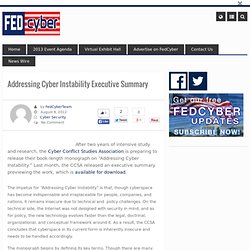
Last month, the CCSA released an executive summary previewing the work, which is available for download. The impetus for “Addressing Cyber Instability” is that, though cyberspace has become indispensable and irreplaceable for people, companies, and nations, it remains insecure due to technical and policy challenges. On the technical side, the Internet was not designed with security in mind, and as for policy, the new technology evolves faster than the legal, doctrinal, organizational, and conceptual framework around it.
As a result, the CCSA concludes that cyberspace in its current form is inherently insecure and needs to be handled accordingly. The monograph begins by defining its key terms. The first vector is strategic level issues. The second research vector is military and operational. Financial malware 'related to Stuxnet' uncovered by Kaspersky Labs - 09 Aug 2012. The College Cyber Security Tightrope: Higher Education Institutions Face Greater Risks. Risks Higher Education Institutions Face Student Internet use is nothing short of the Wild West.
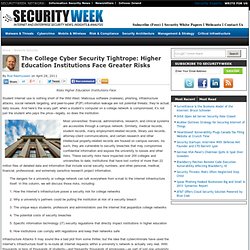
Malicious software (malware), phishing, infrastructure attacks, social network targeting, and peer-to-peer (P2P) information leakage are not potential threats; they’re actual, daily issues. Dorifel Malware Encrypts Files, Steals Financial Data, May Be Related to Zeus or Citadel. Google fixes two holes in Chrome, ships Flash sandbox for Windows. Blizzard Confirms Passwords Stolen in Data Breach. Diablo 3, Starcraft II, and World of Warcraft players: Changed your password lately?
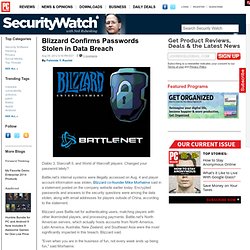
Battle.net's internal systems were illegally accessed on Aug. 4 and player account information was stolen, Blizzard co-founder Mike Morhaime said in a statement posted on the company website earlier today. Encrypted passwords and answers to the security questions were among the data stolen, along with email addresses for players outside of China, according to the statement. Gauss Espionage Malware: 7 Key Facts - Security - Attacks/breaches. From targeting Lebanese banking customers to installing a font, security researchers seem to be unearthing as many questions as answers in their teardown of the surveillance malware.
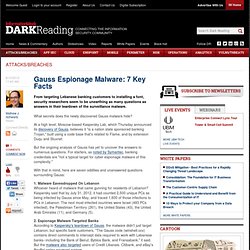
What secrets does the newly discovered Gauss malware hide? At a high level, Moscow-based Kaspersky Lab, which Thursday announced its discovery of Gauss, believes it "is a nation state sponsored banking Trojan," built using a code base that's related to Flame, and by extension Duqu and Stuxnet. But the ongoing analysis of Gauss has yet to uncover the answers to numerous questions. How a social engineer tricked Wal-Mart into handing over sensitive information – Naked Security.
North Island-Based Identity Theft Scheme Affects Over 100 Victims … NIST updates guide for dealing with computer security incidents … The National Institute of Standards and Technology (NIST) has published the final version of its guide for managing computer security incidents.

Is Spyware infected Your Computer? ? Remove Security Toolbar …